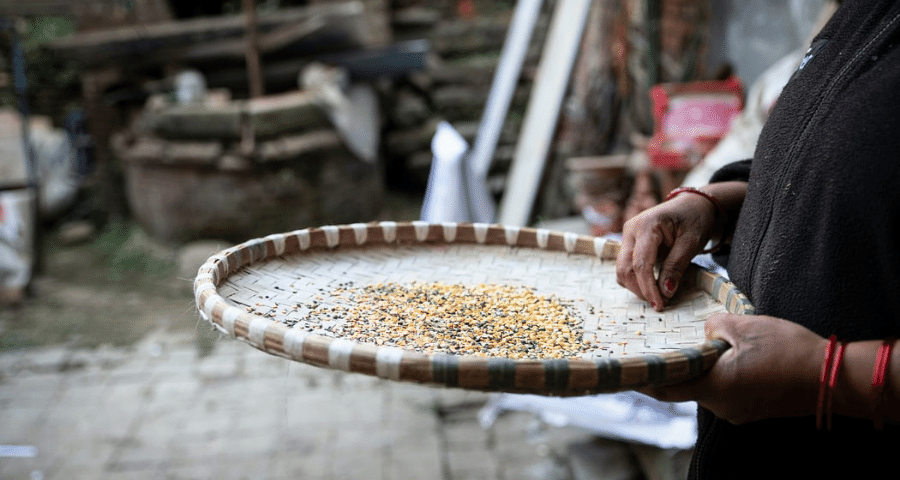
Tell us a little about yourself
I am a professor in a School of Nutrition which trains Masters’ and Ph.D. level students. My work and teaching focuses on both the science and policy (practical application) dimensions of nutrition and food, which is what has always attracted me. I’ve spent a career zig-zagging between research and field practice, believing that each should influence the other.
What got you interested in nutrition?
When living in The Gambia in the early 1980s for my Ph.D. research, I discovered that sometimes price can be irrelevant to dietary choice. This can happen if a specific food is deemed to be an essential, culturally significant, part of a meal; in that case, it was certain strains of local rice for which supply was constrained due to drought. I tried and failed to buy some in my village, learning that whatever I offered was not enough. That got me to delve ever-deeper into the drivers of dietary choice from price and purchasing power perspectives, and how these play out through various manifestations of nutrition/malnutrition.
What do you work on, and how does it relate to public private engagement for nutrition?
My research and teaching foci are global, but often specific to low- and middle-income countries. I manage grant-funded studies in a dozen countries of Africa and South Asia relating to a wide range of issues linking agriculture, poverty, food systems, diets and nutrition.
At the same time, I’ve spent several years advising the Global Panel on Agriculture and Food Systems for Nutrition. On 29th September, the Global Panel along with FAO will launch an important new report called Future Food Systems: For people, our planet, and prosperity. The report assesses the dysfunctional relationship between food systems, health and the natural environment. But it also proposes solutions. It draws on the latest evidence to identify causes of systemic policy failures and identifies a number of essential steps to be taken so that food systems can transition to be more resilient, sustainable, equitable and healthy. In preparing this report, I’ve engaged closely with GAIN and many food industry players to determine appropriate rules of engagement between public and private sector actors. The complex challenges facing nutrition globally in the coming decade must be met through effective policies, investments and actions across sectors that must dovetail better than in the past.

What is exciting about your work?
That there is still appetite in many government circles for science-based recommendations for action. Policy and programming initiatives do emerge as a result of research agendas. Of course, study findings must be ‘translated’ into actionable findings that are understandable by time- and resource-constrained decision makers. But students and junior professionals need to hear more about successful policy-uptake of research, not just cuts in funding, politically-based distortions of science, and government ambivalence when it comes to doing the right thing. Carefully-crafted studies with policy relevance as a defined goal can be very powerful today.
What is challenging about it?
I firmly believe in rigor, both in science and in practice, but it’s hard to come by. One of the main challenges for so-called ‘operations research’ (the study of interventions in the real world) is that constrained budgets and timelines, local politics, and uncontrollable externalities make scientifically-credible attribution of impact incredibly difficult.
What’s the latest news or a recent success?
We’ve just been able to show that food-borne natural toxins (aflatoxins) do have an impact on children’s growth in resource-constrained settings, like Nepal and Uganda. But not directly in terms on stunting (as had been assumed), but via poor birth outcomes, leading to impaired growth of the child. So, the mum’s intake during pregnancy of contaminated foods, like peanuts, cassava or maize, can have an negative outcome for her baby’s potential. This has been very hard to demonstrate empirically, since we had to follow thousands of women through their pregnancy and the children beyond birth, taking many blood samples along the way. This means that we can now argue more strongly for effective policies, regulations, drying and storage technologies for foods in high-risk regions of the world.

What’s next?
A pivot to two extremes of the food system: first, at the macro level, paying much more attention to measuring the role of dietary choices in climate change processes (like greenhouse gas emissions); second, at the micro level, trying to better understand the role of gut microbiome and enteric disfunction in nutrition outcomes. These are two important scientific frontiers which are linked via food system functions of many kinds. The climate science community needs to be better linked to the biological science community in coming years, and there’s no better way to achieve that than by clarifying how food systems affect both.
Has this work made you change your mind about anything?
I used to feel that climate change issues were outside of my expertise and field of responsibility. No more. I feel a responsibility to contribute to enhanced understanding of the underpinnings of, and potential solutions to, both climate change and gut health given what I’ve learned about the roles of food.
If you had to have a slogan, or a strapline, for this work, what would it be?
Your diet is part of the problem -- but also part of the solution -- to climate change and human health combined.
What is your favourite food or meal to share with family or friends?
My favourite food is aged farmhouse Cheddar cheese! I grew up in Somerset in England, a few miles from the village of Cheddar. The real stuff is out of this world, and it bears little resemblance to the pale imitations sold with the same name in other countries. Add some rough granary bread, chutney and fresh Cox’s Orange Pippin apples, and…sigh…
On 29 September, the Global Panel on Agriculture and Food Systems for Nutrition and the UN Food and Agriculture Organization will launch Foresight 2.0, Future Food Systems: For people, our planet, and prosperity.
Register here: Launch of Foresight 2.0